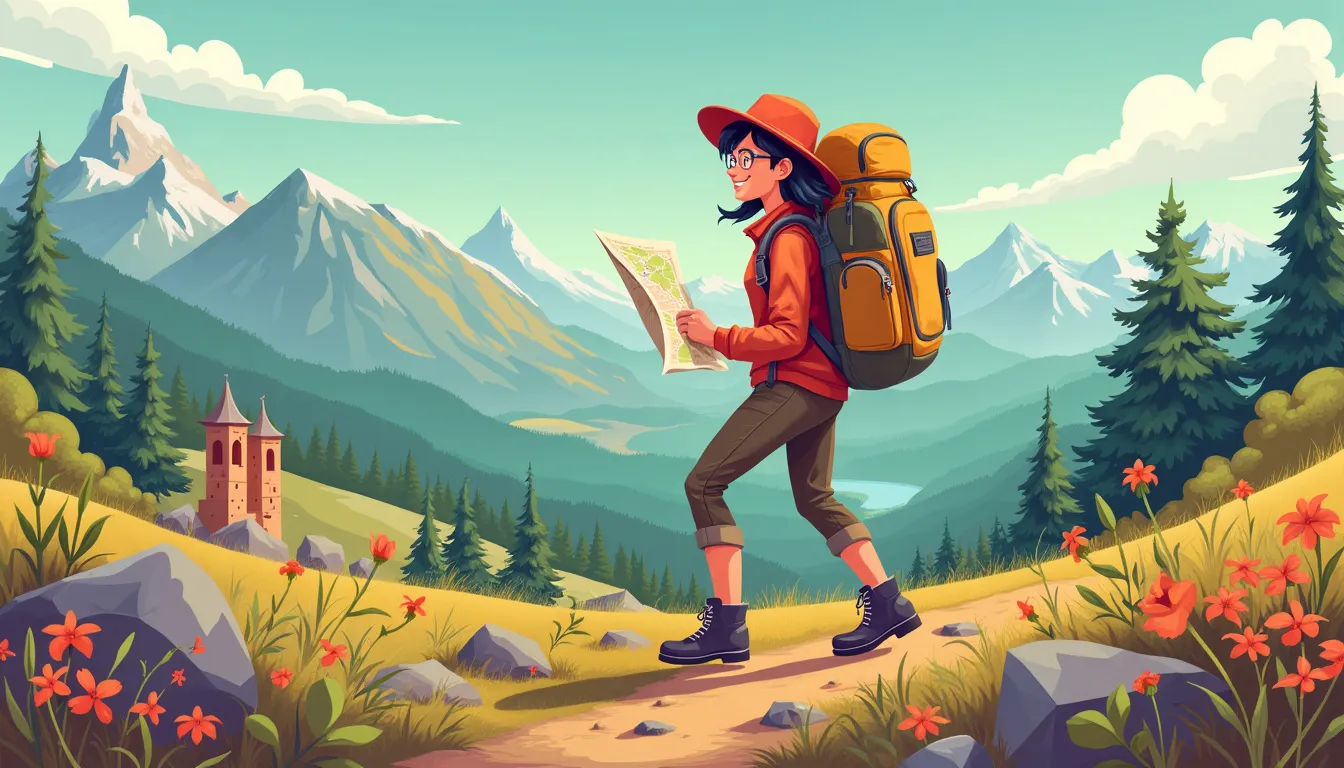Embarking on a solo journey can be one of the most rewarding experiences, offering you the freedom to explore at your own pace, discover hidden gems, and immerse yourself fully in new cultures. However, traveling alone also requires careful planning and mindful practices to ensure both safety and enjoyment. In this comprehensive guide, we’ll share some top tips for traveling alone, designed to help you prepare for your adventure, stay safe, and make the most of your time on the road. From researching your destination and packing smart, to staying connected and embracing the solo experience, our advice will equip you with all the essential knowledge you need for a successful and enriching trip. Whether you’re a seasoned solo traveler or embarking on your first independent adventure, these practical tips for traveling alone will help you navigate your journey with confidence and ease. Let’s dive into the world of solo travel and uncover how you can turn your trip into a memorable and delightful experience.
Preparing for Your Solo Adventure: Essential Tips for Traveling Alone
Research Your Destination: Importance of Understanding Local Customs, Culture, and Safety Practices
Traveling solo can be an empowering and transformative experience, but it requires thoughtful preparation to ensure a smooth journey. One of the most important tips for traveling alone is to thoroughly research your destination before you go. Understanding local customs, culture, and safety practices will enhance your trip and can prevent potential misunderstandings or dangerous situations.
Firstly, familiarize yourself with the local customs and etiquette. Each country has its own set of social norms, values, and behaviors that might be quite different from what you’re used to. For example, in some cultures, it’s important to dress modestly, while in others, specific gestures or phrases might be considered rude. By respecting these customs, you’ll not only avoid unintentional offending behaviors but also possibly endear yourself to locals, making your travel experience richer and more rewarding.
Moreover, learning about the local culture can greatly enhance your experience. Dive into the history, traditions, and daily life of the place you’re visiting. This knowledge can make sightseeing more meaningful and give you insight into the local way of life. It can also provide great conversation starters when meeting new people along the way.
Safety is another crucial aspect to research. Check for travel advisories from reliable sources, such as the government’s travel website or reputable travel organizations. These advisories can provide information on areas to avoid, common scams, and general safety tips for travelers.
In addition, it’s helpful to know the local laws and regulations to avoid inadvertently breaking them. For example, certain countries might have strict regulations on things like alcohol consumption, photography at certain sites, and even chewing gum. Ignorance of these rules can lead to unnecessary trouble, so it’s best to be well-informed.
Packing Smart: Key Items to Include When Traveling Alone and How to Optimize Your Luggage
When it comes to tips for traveling alone, packing smartly is paramount. Not only does it make your trip more convenient, but it also ensures that you’re well-prepared for various situations. Here are some essential items to include and tips on how to optimize your luggage.
Start by making a packing list tailored to your destination. Consider the climate, activities you plan to engage in, and the duration of your stay. Focus on versatile clothing items that can be mixed and matched, which will help you pack lighter. Remember the golden rule: lay out everything you think you need, then take half of it.
For safety and peace of mind, include a first aid kit with basic medical supplies such as band-aids, antiseptic wipes, pain relievers, and any prescription medications you may need. A compact, travel-sized version will suffice and can be a lifesaver in minor emergencies.
Another key item is a copy of important documents. Carry duplicates or digital copies of your passport, travel insurance, itinerary, and emergency contacts. Having these readily accessible can be extremely helpful if you lose your originals or need to provide information quickly.
A reliable travel guidebook or offline map can be invaluable when navigating unfamiliar places without internet access. Although smartphones are incredibly handy, it’s wise to have a backup plan in case your battery dies or you find yourself in an area without signal.
Additionally, invest in a good-quality backpack or suitcase that’s suitable for the type of travel you’re embarking on. If you’re planning on moving around frequently, a durable, comfortable backpack might be the way to go. For those staying in one place longer, a suitcase with sturdy wheels can make your travel easier.
Don’t forget about personal safety items. A small, easily accessible money belt or hidden pouch can keep your valuables secure from pickpockets. Consider items like a personal alarm or door stop alarm for added security in your accommodation.
Lastly, consider your electronic needs. Bring necessary chargers, adapters, and a power bank to keep your devices charged on the go. Depending on where you’re traveling, a portable Wi-Fi device might also be beneficial to ensure you stay connected.
Incorporating these tips for traveling alone into your preparation routine can make a huge difference. By taking the time to research your destination thoroughly and packing smartly, you’re setting the stage for a successful and enjoyable solo adventure.
Discover more travel tips and insights on our blog.

Staying Safe and Making the Most of Your Solo Trip: Effective Tips for Traveling Alone
Traveling alone can be one of the most rewarding and empowering experiences you’ll ever have. However, ensuring your safety and making the most out of your solo journey are paramount. Here are some essential tips for traveling alone that will help you navigate this unique adventure with ease and confidence.
Stay Connected: Using Technology to Stay in Touch with Loved Ones and Emergency Contacts
One of the most crucial tips for traveling alone is to maintain a reliable line of communication with those who care about you back home. In today’s digitally connected world, staying in touch has never been easier. Here’s how you can leverage technology to stay safe and connected:
- Smartphones and Apps: Make sure your smartphone is equipped with essential apps such as Google Maps, a weather app, and your travel company’s app if applicable. Communication apps like WhatsApp, Skype, and Viber allow you to message or call home for free using Wi-Fi.
- Local SIM Cards and International Plans: Purchasing a local SIM card or activating an international plan with your home carrier ensures that you have mobile data and can make emergency calls if needed. This can be particularly useful in areas with unreliable Wi-Fi.
- Emergency Contacts: Before departing, set up a list of emergency contacts, including local emergency numbers and your embassy’s contact information. Store this list both on your phone and in a physical form such as a notebook or card in your wallet.
- Stay Social: Use social media to keep loved ones updated on your itinerary and whereabouts. While it’s nice to share the highlights of your trip, it also adds an extra layer of security as people will know your recent locations.
- Safety Apps: Download apps specifically designed for personal safety. Apps like Red Panic Button or bSafe allow you to send an emergency alert with your location to your pre-selected contacts with the press of a button.
Embrace the Experience: Building Confidence, Making New Friends, and Enjoying the Solitude
Solo travel is not just about seeing new places; it’s also about self-discovery and growth. Making the most out of your journey involves having the right mindset and being open to new experiences. Here are some strategies to embrace your solo adventure fully:
- Build Confidence: Traveling alone can feel daunting initially, but each step you take on your journey will build your confidence. Start with smaller, manageable challenges like navigating public transportation or ordering food in a foreign language. These victories will build your confidence and competence over time.
- Meet New People: Solo travel doesn’t mean you have to be alone the entire time. Join group tours, stay in hostels, or participate in local events and social meetups to meet fellow travelers and locals. Websites like Meetup.com or social media groups can help you find gatherings and activities that match your interests.
- Enjoy Your Own Company: Learning to enjoy solitude is a significant part of solo travel. Take the time to connect with yourself through activities like journaling, meditating, or simply enjoying a quiet meal at a café. This time alone allows for introspection and personal growth.
- Engage with Locals: Don’t be afraid to strike up conversations with locals. Respect cultural customs and boundaries, but take the opportunity to learn from them. You can gain valuable insights into the local way of life and discover hidden gems that aren’t listed in guidebooks.
- Stay Spontaneous: While having a plan is essential, leave room for spontaneity. Some of the best travel experiences come from unexpected opportunities. Whether it’s a last-minute invitation to a local festival or an impromptu detour to a quaint village, be open to the unplanned moments of your trip.
By following these tips for traveling alone, you can ensure a safe, enriching, and enjoyable solo adventure. Stay connected with your loved ones, take advantage of the security that technology offers, and fully embrace the unique experiences that traveling alone provides. Each step you take will not only bring you closer to new places but also to new facets of yourself.
Traveling alone can be one of the most enriching experiences, offering an unmatched sense of freedom and personal growth. By thoroughly preparing for your solo adventure, researching your destination, and packing smart, you lay a solid foundation for a successful trip. Understanding local customs, cultures, and safety practices not only enhances your travel experience but also ensures your well-being throughout your journey.
Once you’re on the move, staying safe becomes paramount. Utilizing technology to stay connected with loved ones and maintaining a network of emergency contacts can provide peace of mind and immediate assistance if needed. Equally important is embracing the unique opportunities that solo travel affords. Building confidence, fostering new friendships, and savoring moments of solitude can transform your trip into a profoundly gratifying experience.
In conclusion, the key tips for traveling alone outlined in this guide help to ensure your adventure is both safe and enjoyable. By combining thorough preparation with a mindful approach to safety and an open embrace of new experiences, you can create unforgettable memories and grow in ways you might never have imagined. So, pack your bags with intention, set out with curiosity, and enjoy the incredible journey that lies ahead.







